In our society, there is a mysterious phenomenon occurring known as “Soul Loss” arising in all people of all ages, genders, races, and backgrounds. Indigenous people have known about the occurrence of Soul Loss for millennia, and understand it as the result of an inner fragmentation caused by a traumatic experience or an intense shock to the mind and body.
While for many of us Soul Loss sounds uncomfortably familiar, this experience is usually temporary, and with the proper inner work, these lost elements of ourselves can be reintegrated into our lives.
What Is Soul Loss?
When we experience Soul Loss, a part of our Soul – or living essence – ‘hides’ or shuts away, hindering us from expressing and experiencing our true potential and wholeness as human beings. Often times entire aspects of our psyches are completely blocked out or repressed.
During my exploration of shamanism and its methods of soul retrieval, Soul Loss was defined as the experience of the Soul traveling to other realms, or alternate realities, and often being possessed by spirits. In the shamanic perspective, when these parts of our Souls are not recovered, we can’t seem to find inner completion or Wholeness.
Before psychology, this explanation was the only way primal cultures could explain (what we refer to in modern times as) trauma in order to find ways to treat it – and it was immensely effective at the time. However, Soul Loss can now be approached from many different angles. We’ll explore these varying perspectives next.
Related: Soul Retrieval: 3 Powerful Ways to Heal Soul Loss
How Does Soul Loss Happen?
Sadly, in our modern world, Soul Loss is the rule rather than the exception.
As individuals, we lose connection with our souls (or True Nature) every time we identify with our egos and seek to feel whole again through addictions, stimulation seeking, dogmatic beliefs, conditional relationships, and workaholism.
But there’s a reason why we identify with the ego and disconnect with the soul in the first place: it’s a survival mechanism. We must develop a sense of self, a separate sense of “me” in the world in order to function. But simultaneously, developing an ego (which is basically one big defense mechanism to ensure that we’re loved, accepted, taken care of, avoid pain, etc.) means that we lose touch with the authentic essence of who we truly are: the Soul.
As a result of Soul Loss, we begin experiencing symptoms of weakness, fatigue, depression, anxiety, and emptiness. We just know that something is missing from our lives – but many of us struggle to discover what exactly is missing. To understand Soul Loss as a loss, or disconnection, from the most vital parts of who we are, is known in psychology as dissociation: the root of many mental illnesses.
The Psychology Behind Soul Loss
So how does the actual process of losing touch with our Soul happen, from a psychological standpoint?
When we become disconnected from the root of who we are, an imbalance is created within the psyche. This disconnection grows through time and can be intensified by traumatic circumstances that have a tendency to fragment the psyche.
What happens when our psyches fragment? The answer is that individual parts of our personality (e.g., the shadow self, anima, animus, etc.) are made independent and thus escape the control of the conscious mind. Lingering in the unconscious mind, these parts of us long to be integrated and to be made conscious, and can resort to extreme measures to get our attention (such as suicidal depressions, self-destructive behavior, sudden rages).
What happens when one of our psychological ‘complexes’ emancipates itself and becomes a tyrannical usurper of consciousness? The result is an increasing feeling of being alienated from ourselves, life, and the Divine. We may live with fear, guilt, and shame as a constant backdrop to our lives. And usually, we feel numb, empty inside, and a sense of hopelessness that we try to smother with work, family life, friendships, gossip, and various addictions.

Soul Loss is Also Known as Dissociation
Soul Loss, in a sense, is another way of saying dissociation.
If you’re familiar with basic psychology, you’ll know that dissociating means disconnecting from something, in this case, ourselves. This disconnection happens as a result of a traumatic situation or environment that we’re subjected to. It’s a defense mechanism that prevents us from totally shutting down and being incapable of functioning.
Here’s a (tragically very common) scenario of how dissociation works:
Imagine that a young child is molested or abused. In order to cope with the horrendous experience, the child escapes by dissociating, or detaching themselves, from the situation. In the process of protecting themselves, the child creates various alter egos, or entirely different personalities within themselves, as a defense mechanism. In psychology, this is treated as “multiple personality disorder” (now known as Dissociative Identity Disorder).
It’s easy to understand how tribal cultures would have perceived this as a loss of the Soul. But essentially, psychological dissociation is nature’s way of protecting ourselves against intense trauma and loss by blocking these wounding situations out.
But Soul Loss, or dissociation, is not limited to these extreme cases and can be found in different degrees in most people. Addictions, eating disorders, identity disorders, post-traumatic stress, depression, codependency, narcissism, low self-esteem, and adjustment disorders are all common causes for (and symptoms of) Soul Loss in our superficial, fast-paced, materialistic modern societies that are mostly devoid of all sense of sacredness.
A young woman who dreams of being an artist but has to live up to her parent’s expectations of being a doctor will lose a little bit of her Soul, ignoring an essential part of her being. Or suppose the young woman does go ahead and follows her dream of being an artist, but deep down she still depends on her parent’s approval. She then either blames them to avoid taking responsibility for pursuing her passion, or she develops depression because she is not accepted by them. This story might sound familiar to you.
Fortunately, there are many ways of finding wholeness again. Most of the material Luna and I write for lonerwolf is a form of Soul Retrieval (or ensoulment), where we help you to become aware of aspects within yourself that may be buried or lost. We do this by encouraging the development of authenticity, self-exploration, self-love, and self-transformation. I’ll explore some common Soul Retrieval practices a little later.
But first, are you experiencing Soul Loss?
Related: 8 Buddhist Beliefs To Heal Your Soul and Find Happiness
21 Signs You Might Be Experiencing Soul Loss
There are a variety of physical, psychological, and spiritual symptoms of Soul Loss.
When we experience Soul Loss – that is, parts of our Soul ‘hiding away’ or dissociating from us – the result is a loss in Soulful energy or the very vitality of our lives. This loss of energy prevents us from living a healthy, fulfilling, and creative existence. Sometimes Soul Loss can last for a whole lifetime, resulting in the development of a self-destructive person who we often refer to as a “Lost Soul” in our language.
To recover these lost parts of ourselves, and to become balanced, whole, and centered once again, we must first identify the symptoms of Soul Loss within us.
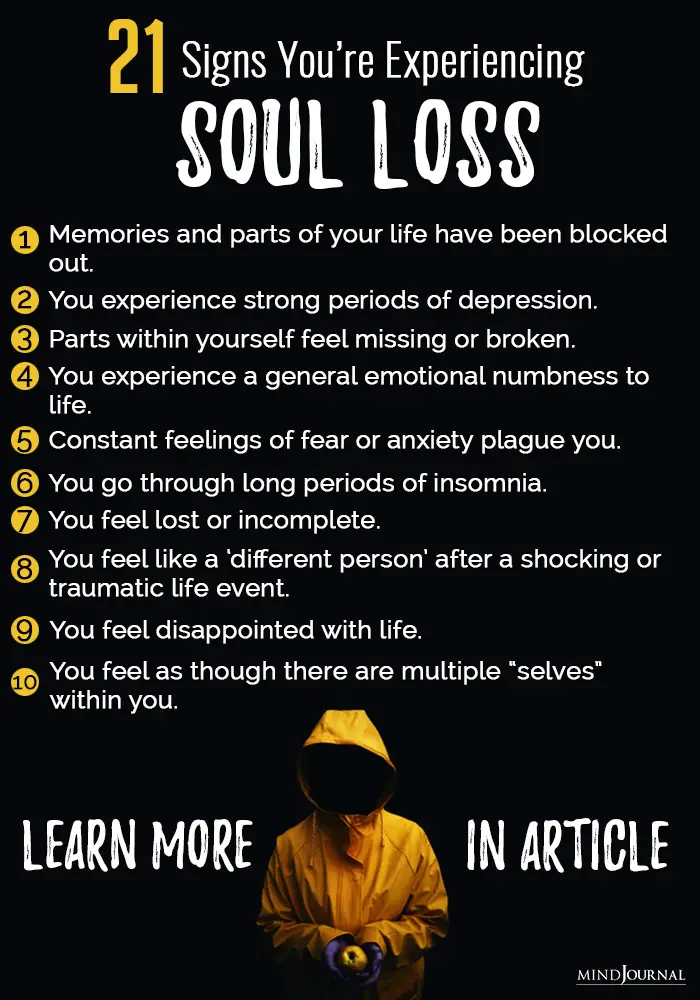
Below you will find some of the most common symptoms:
1. Memories and parts of your life have been blocked out.
2. You experience strong periods of depression.
3. Parts within yourself feel missing or broken.
4. You experience a general emotional numbness to life.
5. Constant feelings of fear or anxiety plague you.
6. You go through long periods of insomnia.
7. You feel lost or incomplete.
8. You feel like a ‘different person’ after a shocking or traumatic life event.
9. You feel stuck or incapable of overcoming a certain issue in your life.
10. You feel disappointed with life.
11. You feel as though there are multiple “selves” within you.
12. You try to escape by turning to alcohol, drugs, sex, television, or excessive busyness.
13. You feel unworthy of being loved.
14. You are experiencing a dark night of the soul and/or spiritual emergency.
15. You want to find your purpose and meaning in life.
16. You feel like your daily life is meaningless and task-driven.
17. You avoid feeling vulnerable and keep others at a distance.
18. You long for wholeness and a sense of belonging.
19. You sometimes feel that you’re not in control of yourself.
20. You constantly feel mentally or physically fatigued for no medical reason.
21. You thirst for authenticity and complete acceptance of yourself.
How many can you relate to? You’re welcome to share in the comments below.
Soul Loss & The Spiritual Awakening Journey
What happens after we experience Soul Loss?
The answer is that usually, we go through an internal crisis (or Dark Night of the Soul) that leads to a deep spiritual awakening. In fact, Soul Loss is typically what triggers an initiation into the mysteries of the inner world in the first place. We get to a point where we just can’t continue living with a sense of existential emptiness and desolation any longer.
A thirst is born deep inside to find our true destiny, place in the world, and meaningful connection with the Divine. Such is the beginning of our spiritual journey – the call to return Home.
Related: The Dark Night Of The Soul
How To Reconnect With Your Soul
“For what shall it profit a man, if he gain the whole world, and suffer the loss of his soul?” – Jesus of Nazareth
Inner work or Soul Retrieval (ensoulment) practices are the best way to reconnect with your soul. This is because they take you on an internal adventure and channel your energy toward your deepest buried feelings, thoughts, and dreams: all of which carry vital parts of you.
There are a multitude of inner work practices out there. Some of those particularly suited to Soul Retrieval may include:
- Inner child work
- Shadow work
- Art therapy
- Dream work
- Mirror work
- Archetype work (also includes Internal Family Systems Therapy)
- Plant medicine journeying (undertake this with an experienced guide)
- Meditation and mindfulness
- Visualization
- Journaling
- Singing and chanting
- Nature immersion and ecotherapy
- Movement therapy (yoga, dancing, etc.)
Choose a few areas you’re interested in and stick with them for a period of a year or more. (However, ultimately use your own judgment – and if you feel overwhelmed by any, stop immediately.) This work takes dedication and sincerity. So go at a slow and steady pace. One day you will look back on the moment you read this article and realize how far you’ve come!
Written by Mateo Sol Source - LonerWolf.com
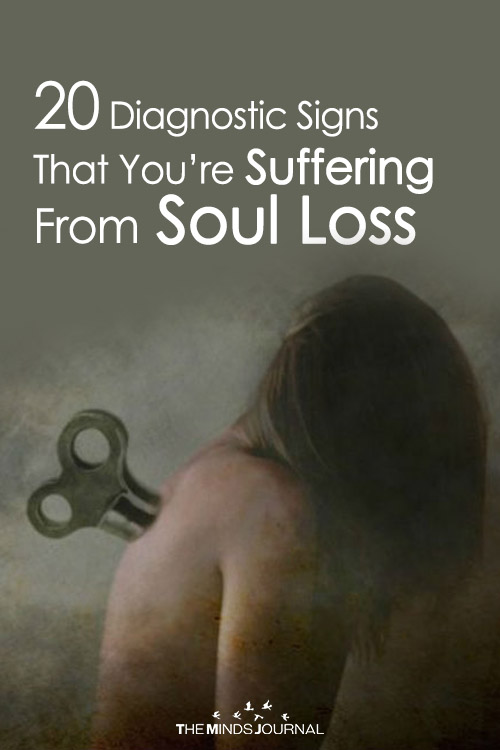
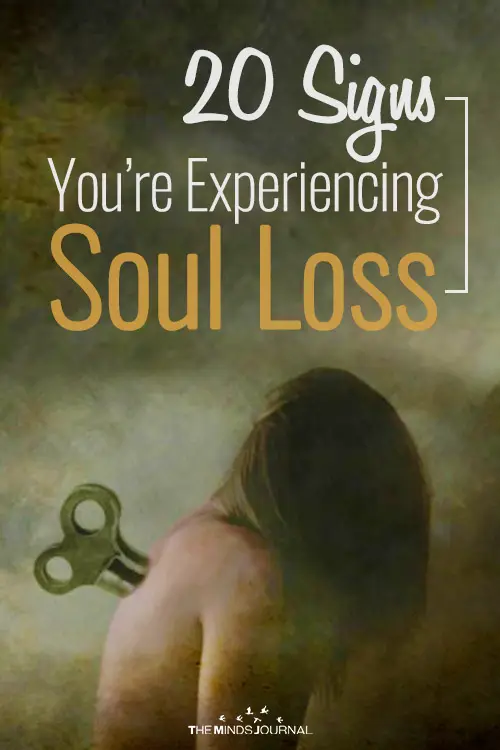

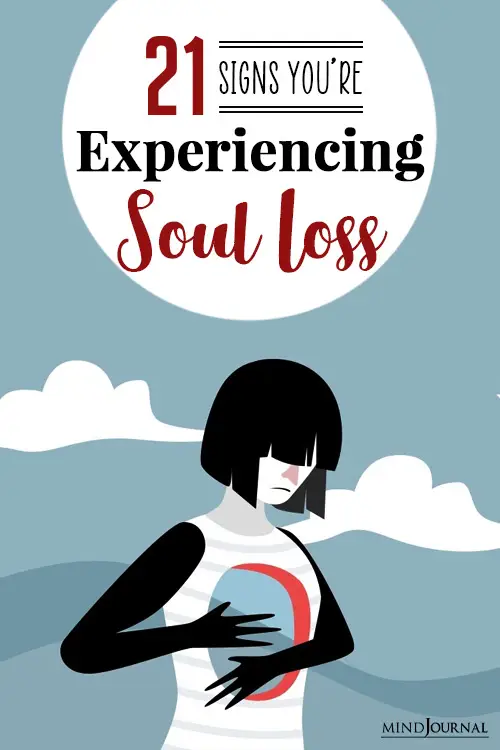
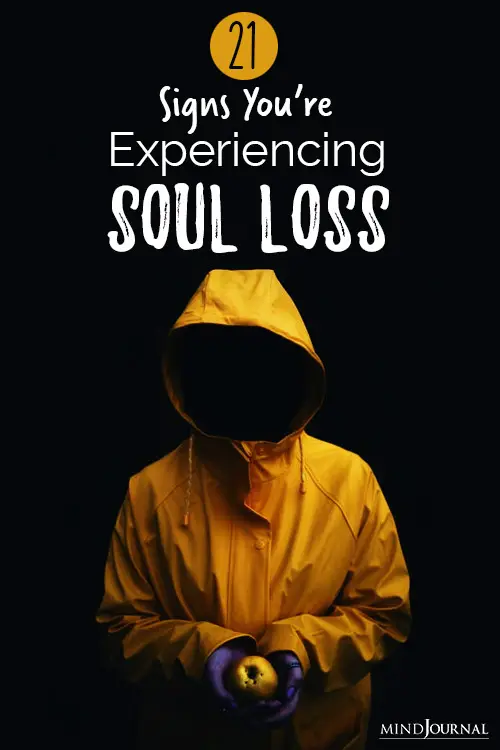
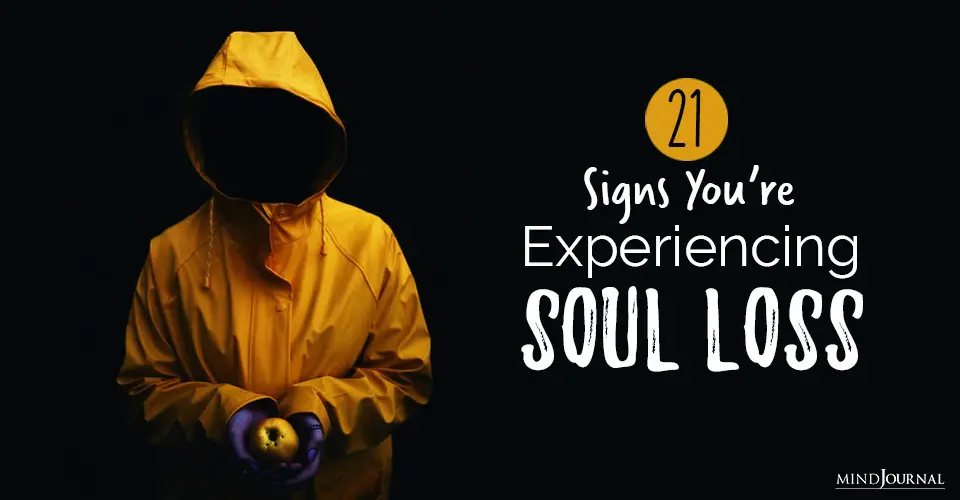







Leave a Reply
You must be logged in to post a comment.